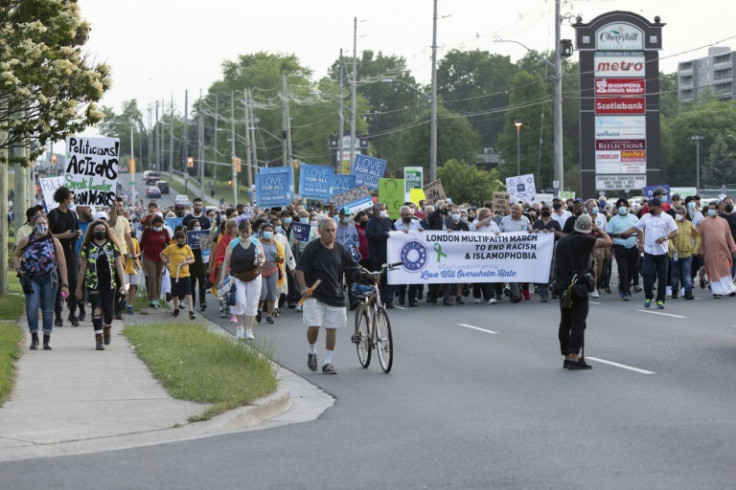Canadian Man Who Killed Family Of Four Was Out 'Hunting For Muslims To Kill'
The accused faces four first-degree murder charges and one count of attempted murder.

A 22-year-old man who killed four members of a Muslim family in the south of Canada's Ontario province in June 2021 was "hunting for Muslims to kill," said the prosecutors in their closing argument on Tuesday.
The man, identified as Nathaniel Veltman, is on trial for killing three generations of a family in London City, Canada.
The victims included Salman Afzaal, 46; his wife, Madiha Salman, 44; their 15-year-old daughter, Yumnah; and her grandmother, Talat Afzaal, 74. The couple's 9-year-old son suffered life-threatening injuries but survived.
Veltman is facing four first-degree murder charges and one count of attempted murder, but he has pleaded not guilty to the charges. He also faces terrorism counts, with prosecutors arguing that the killings were premeditated and that Veltman targeted the family because of their faith, per a BBC report.
Veltman claims he was in a "dreamlike state" when the incident took place on June 6, 2021. The family was out on an evening walk when the accused rammed into them, killing four people on the spot.
Content warning.
— Sarah Mushtaq (@SarahMushMush) November 7, 2023
It is surreal to watch the Veltman trial move to closing arguments in the midst of ~current events~ and being inundated with so many of the same sweeping Islamophobic & racist generalizations about Muslims this guy consumed before murdering #OurLondonFamily. https://t.co/nIM631PFek
According to local media reports, Veltman was arrested soon after in a nearby parking lot. He later told the police he wanted to "send a strong message" against Muslim immigration.
Prosecutor Fraser Ball told the jury that Veltman wrote a "terrorist manifesto," which was found on his computer during the investigation. He added that the accused was "dressed like a soldier" and "was hunting for Muslims to kill".
"[He] had a message for Muslims: leave this country or you and your loved ones could be next. Actions speak louder than words and his actions were louder than a bomb and every bit as deadly," Ball said during his closing address in Ontario Superior Court in Windsor on Tuesday.
The defence is making a case for manslaughter stating that Veltman suffers from mental disorders that led to "depression and anxiety".
It is being reported that he ate three grams of hallucinogenic psilocybin mushrooms before the attack. Defense lawyer Christopher Hicks said that this left him feeling detached from reality "as if in a dream or surreal state, a state of extreme confusion wherein his brain was in turmoil".
"He is responsible for the deaths of these people," Hicks said while adding that Veltman did not have the "mental acuity for planning and deliberation" for murder or terrorism.
Veltman faces life in prison if convicted of first-degree murder. In Canada, manslaughter carries a maximum penalty of seven years in prison.
Canada has witnessed a rise in extremist activity. over the years. In 2017, six people were killed after Alexandre Bissonnette, a French-Canadian national, opened fire while evening prayers were taking place at the Quebec City Islamic Cultural Center.
The victims of the attack were Khaled, 60; Abdelkrim Hassane, 41; Mamadou Tanou Barry, 42; Ibrahima Barry, 39; Azzedine Soufiane; and Aboubaker Thabti, 44. All of them were immigrants who had come to Quebec for a better life. The shooter was sentenced to 40 years in prison, but that was lowered on appeal.
Police crime data gathered by Statistics Canada revealed that in 2014, Quebec province witnessed the second-highest rate of crime triggered by religious prejudice. Between 2012 and 2014, crimes due to prejudice against Muslims more than doubled in the country.
In September of this year, the four survivors of the attack who tried to stop the gunman were awarded medals of bravery by the Governor General of Canada, Mary Simon. Soufiane, who died trying to disarm the gunman, was awarded the Star of Courage posthumously. It was presented to his family at an event at the Citadelle of Quebec.
Saïd Akjour, Hakim Chambaz, Aymen Derbali, and Mohamed Khabar were all awarded the Medal of Bravery for trying to save people during the attack. Derbali, whose injuries left him bound to a wheelchair, said that he was touched to receive the award.
© Copyright IBTimes 2025. All rights reserved.




















